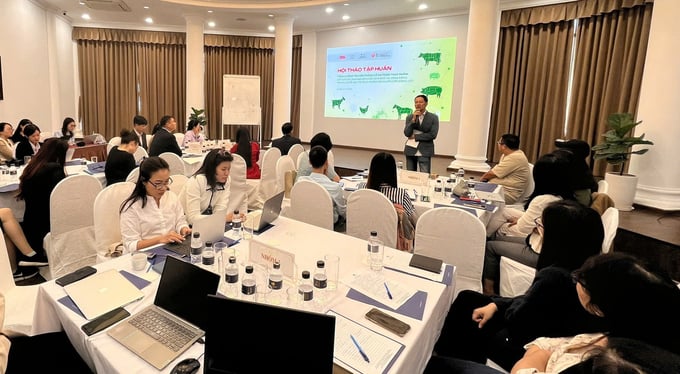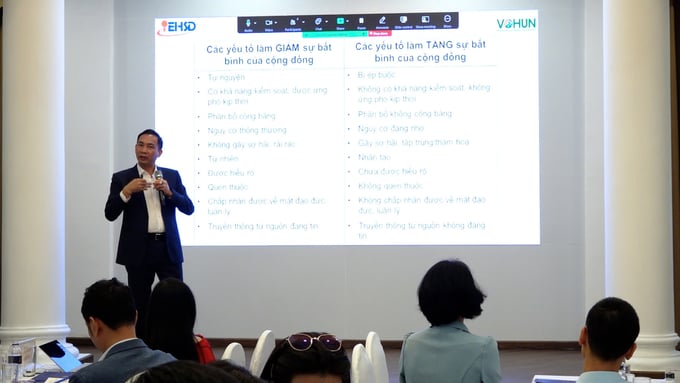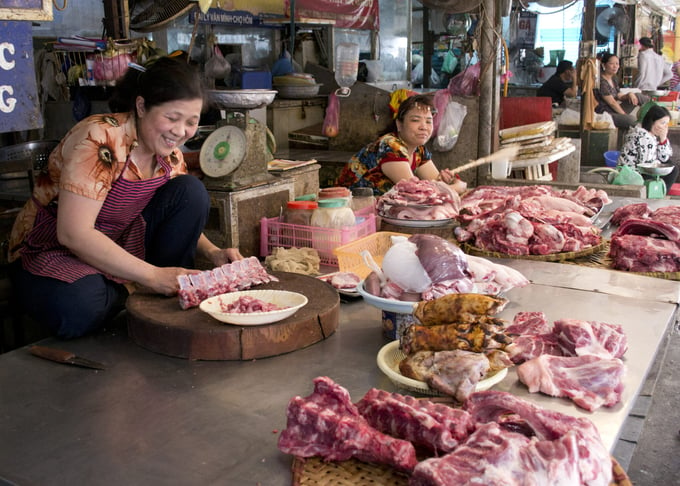May 21, 2025 | 03:42 GMT +7
May 21, 2025 | 03:42 GMT +7
Hotline: 0913.378.918
May 21, 2025 | 03:42 GMT +7
Hotline: 0913.378.918

The training workshop on enhancing communication about food safety took place on the morning of December 5, in Hanoi. Photo: Quoc Nhat.
On December 5, the Vietnam Agriculture Newspaper, in collaboration with the International Livestock Research Institute (ILRI), organized a training workshop titled “Enhancing communication on food safety: Connecting researchers, journalists, and communities in the animal-sourced food value chain.”
The workshop aimed to emphasize the importance of food safety in the food supply chain while providing practical communication strategies to convey clear and accurate messages to the public.
Journalists, reporters, and editors attending the event had the opportunity to explore key topics such as food safety and food systems, principles of effective risk communication, and challenges faced by journalists in reporting on food safety, guided by experienced experts.
Welcoming the journalists to the workshop, Mr. Le Trong Dam, Deputy Editor-in-Chief of Vietnam Agriculture Newspaper, stated "In the food value chain, food safety emerges as a critical issue requiring interdisciplinary coordination and active involvement from researchers, regulatory agencies, and especially the media. Through this workshop, we aim to build a core journalism network and raise community awareness about food safety."
The Deputy Editor-in-Chief of Vietnam Agriculture Newspaper expressed hope that close collaboration between researchers and the media would contribute to substantial changes in this vital field.

Professor Pham Duc Phuc moderated the discussion session on food safety risk communication. Photo: Nguyen Thuy.
“Vietnam faces numerous issues such as food containing chemicals, microbiological contamination, and misinformation about food origins,” affirmed Dr. Pham Duc Phuc, Director of the Institute of Environmental Health and Sustainable Development. He further emphasized that effective risk communication requires transparency, understanding and empathy toward the target audience, timely delivery of information, and the use of scientific evidence to strengthen messages.
Additionally, the role of communication chains for animal-based food products is crucial in the current context, particularly in pork production. Appropriate interventions and communication solutions are needed to ensure the safety of these supply chains. Encouraging community participation is also essential in building public trust. Moreover, it is important to address uncertainties, controversial issues, and handle negative information tactfully.

ILRI has implemented food safety interventions to mitigate risks at traditional markets. Photo: CGIAR.
Alongside this, the panel discussion on innovative approaches in food safety communication focused on clarifying the connection between risk, scientific information, and communication. It also aimed to propose more specific and effective solutions for risk communication in food safety.
Dr. Freg Unger, Regional Representative of ILRI East and Southeast Asia, emphasized during his closing remarks that discussions around food safety often focus heavily on chemical contamination, overlooking the significant threats posed by biological contamination. Bridging this gap requires more than just data presentation as it calls for innovative, and targeted communication strategies for the audience, whether they are rural farmers, urban consumers, or decision-makers.
"Another key takeaway is the role of collaboration. Panelists highlighted that researchers and journalists have unique strengths, but their impact is increased when they work together. By simplifying scientific terms, and by countering misinformation with accessible, evidence-based messages, we can begin to change the narrative around food safety.", Dr. Freg stated.
Experts highlighted that an ideal food system should meet consumer demands for food safety and quality while promoting socio-economic welfare, reducing ecological pressures, and enhancing resilience to shocks.
Moreover, individual attitudes and motivations, taste preferences, convenience, and health-related perceptions play a decisive role in consumers' food choices.
There is a close relationship between consumer behavior and their food environment, as this environment plays a crucial role in determining food choices. Consumers eat what is available to them; therefore, the diversity of food options shapes consumer behavior.
Translated by Kieu Chi

(VAN) In 2024, over 295 million people across 53 countries and territories faced acute hunger—an increase of almost 14 million people compared to 2023, while the number of people facing catastrophic levels of hunger reached a record high.

(VAN) World Environment Day 2025 (June 5) carries the theme 'Beat Plastic Pollution' continuing to emphasize the global urgency of addressing the plastic waste crisis.

(VAN) This was the assessment shared by experts at the workshop titled 'Assessing the Role and Potential of Low-Emission Rice Production Systems in Vietnam,' held on the morning of May 19.

(VAN) Cai Rong Port is the fisheries control center of Quang Ninh, helping to monitor fishing vessels, combat IUU fishing, and remove the EC's 'yellow card'.

(VAN) The German Agricultural Society (DLG) explores the possibility of establishing a mechanization service center in Vietnam’s Mekong Delta to support farmers in accessing and utilizing advanced machinery.

(VAN) On May 16, the Department of Water Resources Management, in collaboration with the Food and Agriculture Organization of the United Nations (FAO), held a signing ceremony for the GEF-8 project document.

(VAN) Food safety, mechanization, vocational training, and market opening are key areas of cooperation expected between the Vietnamese Government and the Federal Republic of Germany.